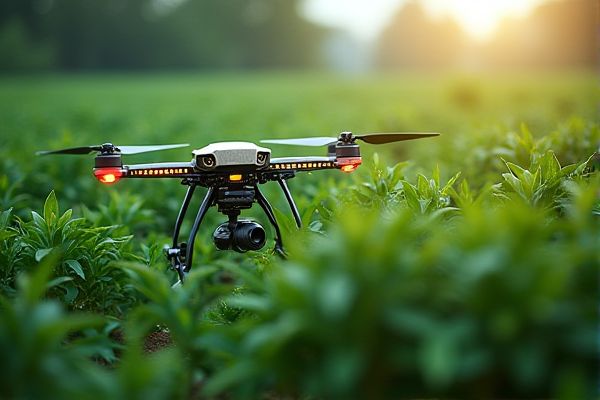
AI enhances precision agriculture by analyzing data from various sources, including satellite imagery, soil sensors, and weather forecasts. Farmers utilize AI algorithms to optimize planting schedules, monitor crop health, and manage resources efficiently. Drones equipped with AI can scout farmlands, providing detailed insights into field conditions and potential pest infestations. The integration of machine learning models allows for tailored approaches to irrigation and fertilization, significantly improving yield while minimizing environmental impact.
AI usage in precision agriculture techniques
Crop Yield Prediction
AI technologies can significantly enhance precision agriculture by providing accurate crop yield predictions, which help farmers optimize their operations. By analyzing data from various sources like satellite imagery and soil sensors, AI enables farmers to make informed decisions for better resource management. For example, institutions like the University of California are exploring AI models to forecast yields based on environmental conditions and historical data. This optimization can lead to increased efficiency and potentially higher profits for agricultural businesses.
Soil Health Monitoring
AI can enhance precision agriculture techniques by analyzing large datasets to optimize crop yields. For instance, soil health monitoring systems can utilize AI algorithms to assess nutrient levels and detect potential issues early. This can lead to more efficient use of resources, potentially increasing harvest quality and quantity. Farmers adopting technologies like these could gain a competitive edge in the market.
Pest and Disease Detection
AI technologies can enhance precision agriculture by improving pest and disease detection, allowing for timely interventions. For example, machine learning algorithms can analyze satellite imagery to identify crop health and potential threats. This can lead to more efficient use of resources, minimizing pesticide application and maximizing yield. The adoption of such technologies may also contribute to sustainable farming practices, ultimately benefiting agricultural institutions like universities engaged in agricultural research.
Irrigation Management
AI can enhance irrigation management in precision agriculture by analyzing soil moisture levels and weather patterns to optimize water usage. For instance, the use of predictive analytics can help farmers determine the best times to irrigate, reducing waste and improving crop yields. Integrating AI with sensor data can lead to more tailored irrigation strategies, benefiting large-scale operations such as those managed by agricultural institutions. This approach holds the potential to maximize efficiency and minimize the environmental impact of water usage in farming.
Drone Surveillance
AI technology can significantly enhance precision agriculture techniques by analyzing data from various sources. For instance, drone surveillance offers detailed aerial imagery that can be processed by AI algorithms to assess crop health and optimize resource allocation. The integration of these technologies may result in improved yields and reduced operational costs for farmers. Exploring the potential of AI-driven insights can lead to more sustainable farming practices within institutions focusing on agricultural innovation.
Smart Farming Equipment
AI in precision agriculture can enhance crop yield through data-driven insights and optimization. Smart farming equipment, such as drones and sensors, can analyze field conditions in real time to improve resource management. This technology may lead to reduced waste and lower operational costs for farmers. Implementing these systems could result in more sustainable practices and improved food security.
Automated Harvesting
Precision agriculture techniques leverage AI to optimize crop yields by analyzing soil conditions and weather patterns. Automated harvesting systems, such as those used by companies like John Deere, enhance efficiency and reduce labor costs. The integration of AI can predict the best times for planting and harvesting, potentially increasing output. Farmers adopting these technologies may experience improved sustainability and resource management.
Weather Pattern Analysis
AI has the potential to enhance precision agriculture by analyzing weather patterns, allowing farmers to make informed decisions regarding planting and harvesting times. For example, institutions like the USDA are exploring AI-driven algorithms to predict rainfall and temperature fluctuations. This technology can optimize crop yields by tailoring irrigation and fertilization strategies to specific weather forecasts. The integration of AI in this field offers the possibility of increasing efficiency and reducing resource wastage.
Resource Optimization
AI can enhance precision agriculture by optimizing resource allocation, leading to reduced waste and cost savings. For instance, machine learning algorithms analyze soil conditions and weather patterns, allowing farmers to make informed decisions about irrigation and fertilizer application. By utilizing sensor technology and satellite imagery, farms can monitor crop health in real-time, improving yields and minimizing environmental impact. The potential for greater efficiency in operations can significantly benefit institutions focused on sustainable agriculture practices.
Livestock Monitoring
Precision agriculture techniques, such as satellite imaging and soil moisture sensors, can enhance crop yield and resource efficiency. Implementing AI-driven livestock monitoring systems allows farmers to track animal health and optimize feed management, potentially leading to increased productivity. Institutions like the University of Illinois are researching these technologies to further improve agricultural practices. The integration of AI may also reduce operational costs by streamlining processes and minimizing waste.
 techknowy.com
techknowy.com